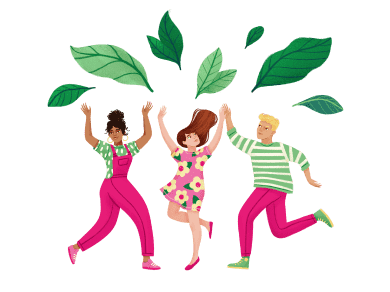Leanne Ward's passion for nutrition

We caught up with Leanne Ward to learn more about her journey and passion for wellbeing.
Hi Leanne! We'd love to learn more about you and your story. Can you share with us how and why you got into the health and nutrition field?
I've always been interested in food, nutrition and health. My mum was very healthy and made most meals at home from scratch when we were growing up, so we got to eat lots of delicious homemade things like jams, tomato chutney, and healthy versions of the takeaway foods we wanted.
With a passion for helping people, in my high-school years, I became focused on the fields of physiotherapy, medicine or nutrition. I think nutrition really called to me as I could help people and be involved in health care, but also talk about food all day long!
I had also experienced my own issues with food and body image in my teens. Being tall for my age (I was 6ft at around 15 years old) people were always telling me I was a “big” girl and, even though I was quite thin, I felt so tall and awkward. I just wanted to be "smaller" and blend in. This led to some disordered eating in my late teens and early 20’s, where I would eat super "clean" and healthy, count calories, over-exercise and then, feeling so restricted by the weekend, I’d have a big blowout and then have to re-start over again every Monday.
Compounding this, I had a really severe case of "Bali Belly" at around 19-years-old which caused gut issues for many years. Doctors struggled to work out all my symptoms and I was finally diagnosed with IBS many years later.
Due to my love of food and health care, my own struggles with nutrition, exercise and body dysmorphia, and also my gut health issues, studying nutrition was an obvious choice for me.
Do you have a particular area of interest in the wellness/nutrition field? What are you most passionate about?
After studying a Bachelor of Health Science (nutrition major), I worked as a public health nutritionist for a year and a half. I loved this role, but I realized that what I really wanted was to be able to apply nutrition to disease treatment and not just prevention. So I went back and studied for a Masters of Dietetics.
Following that, I was fortunate enough to get a job as a clinical dietitian in a Brisbane hospital. I worked in a range of areas, from medical and surgical wards, the rehab and orthopaedic wards and also worked in the outpatient clinic as the weight management dietitian, the women’s health dietitian and — in my favourite role there — as the gastroenterology dietitian. During my final few years of work at the hospital, I worked with lots of women who had issues with their weight, emotional eating and gut health all tied in one. These women would often get stuck in this vicious cycle where they would overeat, then suffer digestive discomfort and have a hard time maintaining or losing weight due to the resulting emotional and stress eating.
Sadly, working in this free clinic, appointments were limited to just 20-30 minutes and were spread so far apart that it was difficult for patients to feel motivated to change, and disheartening for me to see little if any real results. I knew that I wanted to be able to help and support more clients more regularly. So, two years ago I walked away from my permanent hospital job and launched Leanne Ward Nutrition. I currently have a worldwide coaching business (LEAN Gut Mind Method) with five dietitians working with me. We work with women 1:1 to support them to conquer their emotional eating, improve their gut health and help them to lose weight sustainably for the long term. We also offer them daily support and accountability, which is really the key to their success long term as we are able to get on top of any self-sabotage, self-doubt or struggles they face on a regular basis.
The three areas of female-focused fat loss, gut health and emotional/non-hungry eating make me so excited to be a nutritionist and dietitian. I'm so passionate to help women as these areas are all interconnected and can truly change someone’s life when we get on top of them
Do you have any advice for people just starting out on their well-being journey? What three things can we do to make a big difference to our everyday health and wellbeing?
1. Focus on veggies and plant-based foods. It's crazy to think that 90% of us Aussies don’t eat enough vegetables. We need to aim for 5+ serves a day, consistently. An example of a serving of veggies is 1 cup of raw salad or ½ cup of cooked veggies. This is a great place to start as most people who try to improve their wellbeing or health make the mistake of focusing on what they can’t have. Instead, I like to focus on what you can (and should!) add to your diet.
2. Make your health a priority. We all have the same 24 hours in a day, and it's up to you what you do with it. If your health is a priority, you need to make the time for it. If you’re busy, rather than using it as an excuse, find ways to make things easier. For example, I use meal delivery services for some weeks or buy pre-cut veggies to save time. I use the weekends for meal prep so that during the week when I am busy or tired, I can just pull a yummy stir-fry, curry or lasagna out of the freezer and simply heat it up.
3. Focus on sleep. In this busy day and age, we wear our "lack of sleep" like a badge of honour but sleep is so incredibly important to our wellness journey. Aim for a minimum of 7 hours a night and create a healthy bedtime routine where you turn all screens off at least 1 hour before bed. Focus on using that last hour of the day to do some self-care activities to wind down for the night such as mediation, journaling or some gentle stretching.
Finally, we know there's a lot of "wellness" information out there on the internet and our social feeds. And some of it can be pretty misleading! What advice do you have for our readers to help them sort out the good advice from the bad?
Always ask yourself, "what is the source?" Look for university qualifications or registration with the national governing health or medical bodies as a great starting point. If you're receiving medical advice, ask the person giving it if they have insurance. This is a great way to weed out the well-meaning influencers from trusted, qualified professionals.
I'd always look to make sure the person isn't pushing one particular agenda or angle on health. For example, I'd avoid advice coming from anyone who is advocating that you MUST do fasting, low carb, gluten-free etc. to “get results”. Sure, these approaches can work for some people. But, everyone is unique. As a coach, our job is to find an approach that works for the client — not for us. Qualified experts understand there are many different approaches that work for many different people — there’s no “one size fits all” in health care.
It's important to understand that research and science are constantly changing. So make sure the person you are reading from or listening to is up to date with the latest research.
And finally — if someone has a disclaimer on the bottom of their website or blog, like “this advice is only my opinion and you should consult your own doctor first,” then that's probably a good indication that they're not appropriately qualified. Opinions are great, but when it comes to your health I always recommend going with evidence-based and qualified advice.
Share the fancy




